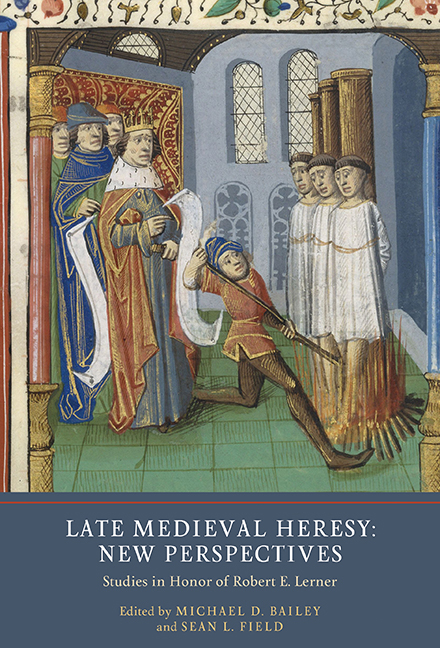Book contents
- Frontmatter
- Contents
- Preface: Robert E. Lerner: A Portrait
- List of Contributors
- Introduction: Historiography, Methodology, and Manuscripts: Robert E. Lerner and the Study of Late Medieval Heresy
- 1 The Heresy of the Templars and the Dream of a French Inquisition
- 2 The Dissemination of Barthélemy Sicard's Postilla super Danielem
- 3 Magic, Mysticism, and Heresy in the Early Fourteenth Century
- 4 The Making of a Heretic: Pope John XXII's Campaign against Louis of Bavaria
- 5 Unusual Choices: The Unique Heresy of Limoux Negre
- 6 Princely Poverty: Louis of Durazzo, Dynastic Politics, and Heresy in Fourteenth-Century Naples
- 7 Disentangling Heretics, Jews, and Muslims: Imagining Infidels in Late Medieval Pastoral Manuals
- 8 New Frontiers in the Late Medieval Reception of a Heretical Text: The Implications of Two New Latin Copies of Marguerite Porete's Mirror of Simple Souls
- 9 Disputing Prophetic Thought: The 1466 Questio quodlibetalis of Johannes of Dorsten
- 10 Heretics, Allies, Exemplary Christians: Latin Views of Ethiopian Orthodox in the Late Middle Ages
- 11 ‘By them in reality I meant the Jews’: Medieval Heretics in the Work and Life of Renate Riemeck (1920–2003)
- Afterword: Who or What Was a Heretic in the Late Middle Ages?
- Robert E. Lerner: A Chronological Bibliography
- Index
- York Medieval Press: Publications
10 - Heretics, Allies, Exemplary Christians: Latin Views of Ethiopian Orthodox in the Late Middle Ages
Published online by Cambridge University Press: 14 June 2019
- Frontmatter
- Contents
- Preface: Robert E. Lerner: A Portrait
- List of Contributors
- Introduction: Historiography, Methodology, and Manuscripts: Robert E. Lerner and the Study of Late Medieval Heresy
- 1 The Heresy of the Templars and the Dream of a French Inquisition
- 2 The Dissemination of Barthélemy Sicard's Postilla super Danielem
- 3 Magic, Mysticism, and Heresy in the Early Fourteenth Century
- 4 The Making of a Heretic: Pope John XXII's Campaign against Louis of Bavaria
- 5 Unusual Choices: The Unique Heresy of Limoux Negre
- 6 Princely Poverty: Louis of Durazzo, Dynastic Politics, and Heresy in Fourteenth-Century Naples
- 7 Disentangling Heretics, Jews, and Muslims: Imagining Infidels in Late Medieval Pastoral Manuals
- 8 New Frontiers in the Late Medieval Reception of a Heretical Text: The Implications of Two New Latin Copies of Marguerite Porete's Mirror of Simple Souls
- 9 Disputing Prophetic Thought: The 1466 Questio quodlibetalis of Johannes of Dorsten
- 10 Heretics, Allies, Exemplary Christians: Latin Views of Ethiopian Orthodox in the Late Middle Ages
- 11 ‘By them in reality I meant the Jews’: Medieval Heretics in the Work and Life of Renate Riemeck (1920–2003)
- Afterword: Who or What Was a Heretic in the Late Middle Ages?
- Robert E. Lerner: A Chronological Bibliography
- Index
- York Medieval Press: Publications
Summary
Thirty years after its initial publication, it seems safe to say that R. I. Moore's theory of the ‘formation of a persecuting society’ in Latin Christendom by the mid-thirteenth century has withstood the test of time. As the essays within and beyond the present collection confirm, in the subsequent two centuries heresy came to be applied to an increasingly large and diverse collection of individuals, groups, and practices, and was investigated and prosecuted by clerical authorities in an increasingly efficient manner.
In at least one case, however – that of Ethiopian Orthodox Christians – the Latin Church became not more eager to perceive and root out heresy over the course of the late Middle Ages, but less. Certainly the ultimate goal of Latin policy toward Ethiopian Orthodox, and indeed toward all eastern Christian communities from Byzantium to India, remained constant: to bring them into ecumenical union with Rome. It was the language with which Ethiopian Christians were depicted, and the concrete ways in which union was pursued, that altered over time. At first seen as heretics toward whom the preferred policy was proselytization and conversion, Ethiopian Orthodox gradually came to be viewed as relatively proximate to Latin Christians, their deviations downplayed and their Christian virtues lauded. At the same time, the papacy largely abandoned missionary efforts in favor of diplomatic negotiation and the generous treatment of Ethiopian visitors to the West. There were, of course, exceptions to this general arc of development, and the diversity of Latin views throughout the late medieval centuries should not be underplayed. But until the last decades of the fifteenth century, what we may call a dominant view, shared by popes and by those clerics most concerned with Ethiopian Orthodox, followed this increasingly tolerant course.
As I hope to demonstrate in what follows, this shift was not caused by an increase or change in Latin knowledge about Ethiopian Orthodoxy itself. Latin observers did improve their understanding of Ethiopia's geographical location, political circumstances, and distinctions from other eastern Christian communities over time, but from the beginning their knowledge of Ethiopian Orthodoxy's most salient features was fairly accurate. The shift was caused rather by changes in Ethiopia's perceived utility to the Latin West, first militarily (and this remained, throughout the late Middle Ages, its most compelling feature), and then intellectually as well.
- Type
- Chapter
- Information
- Late Medieval Heresy: New PerspectivesStudies in Honor of Robert E. Lerner, pp. 195 - 214Publisher: Boydell & BrewerPrint publication year: 2018



